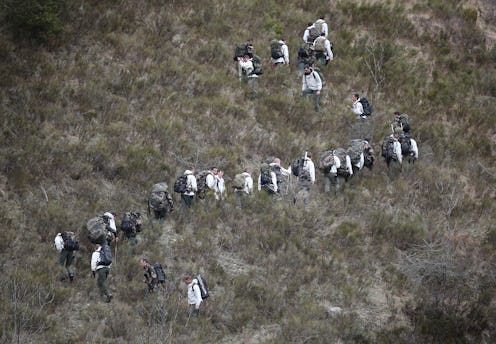News
What We Know So Far About Andreas Lubitz
What do we know so far about Andreas Lubitz, the pilot who reportedly steered Germanwings flight 4U9525 into her lethal descent? Not a huge amount, as it happens — authorities have given little information away about the man responsible for the deaths of the plane’s 150 passengers. Thursday's comments from chief prosecutor Brice Robin, who's in charge of the investigation, suggest that Lubitz deliberately crashed the plane, hoping to “destroy” the aircraft. But we don’t know why — and his identity may be a big part of solving that puzzle.
Prosecutor Brice Robin said of the moment before the crash, as revealed by the recovered black box: “The co-pilot is alone at the controls … He voluntarily refused to open the door of the cockpit to the pilot and voluntarily began the descent of the plane.” Lubitz has been named as the pilot in control, and thus responsible for one of France’s worst ever aviation tragedies.
We know Lubitz was a 28 years old German citizen, and we know he was breathing calmly up until the plane’s impact. Robin, the French prosecutor, said he did not know the ethnicity of Lubitz— he could only say he was from Germany. The Telegraph reports that both Lubitz and co-pilot Patrick S had trained at Lufthansa Flight Training School in Bremen.
Lubitz, at only 28, had been termed “young” by colleagues. According to the Telegraph, he was from Montabaur, in Rhineland-Palatinate, and joined Germanwings in September 2013, straight after graduating from Lufthansa’s Bremen academy. Montabaur's mayor Gabriele Wieland reportedly told the DPA press agency that Lubitz lived with his parents in the city, and kept a residence in Dusseldorf.
Before Robin released his statements isolating Lubitz as the deliberate actor in the crash, LSC Westerwald, a flying club where Lubitz had been a member since his youth, published a tribute to him. They wrote:
Andreas died as First Officer on the tragic flight. Andreas became a member of the association as a teenager, he wanted to realize his dream of flying. He began as a gliding student and made it to become a pilot on an Airbus 320. He was able to fulfill his dream, the dream he has now so dearly paid for with his life.
The Guardian reports that neighbors described Lubitz as "friendly," somebody who pursued his dreams "with vigor." Neighbors told local paper Rhein Zeitung that he kept fit by running regularly. “How often we saw him jogging past our house,” the neighbor said.
Now Robin’s revelation that the plane’s swift descent was a “voluntary action” controlled by Lubitz has complicated the picture of the innocent young pilot. The prosecutor said he had briefed the families of the dead before speaking to the press. There was, he pointed out, no evidence to link Lubitz to terrorist groups. He did not say whether the incident had the hallmarks of a suicide, but said it was a “legitimate” question to ask. There are at present no indicators that Lubitz was depressed, or had communicated a desire to end his life in the days leading up to the crash.
The Guardian has drawn information from the Aviation Business Gazette regarding Lubitz. The Gazette reveals that his middle name was Guenter, and that he was listed on the “prestigious FAA [Federal Aviation Administration] Airmen Certification Database.” The database includes the names of “certified pilots who have met or exceeded the high educational, licensing and medical standards established by the FAA.” It goes on to say:
Pilot certification standards have evolved over time in an attempt to reduce pilot errors that lead to fatal crashes. FAA standards, which are set in consultation with the aviation industry and the public, are among the highest in the world.
Images: Getty Images (1)
